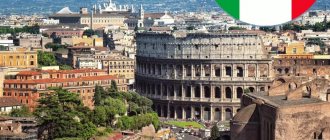If you are thinking about opening a business in Italy after moving, then this is quite a feasible task. The main thing is to have a plan, show determination and perseverance. These qualities will require start-up capital.
Western European GDP
After registering a legal entity, Russians will have to go through certain stages. Opening a business makes it easier to obtain a residence permit.
You can find out what you need to go to live in Italy by following this link.
General information about business immigration
Moving to the country to open a business is the most practical form of immigration to Italy in 2021. At the same time, the entrepreneur quickly receives a residence permit. Since 2002, the country has had Law No. 189 of July 30, 2002, which simplifies the organization of business activities for foreigners in Italy.
Businessmen can handle the paperwork themselves or entrust the support of a professional immigration company. After registering a legal entity, you are granted a “D” visa and a temporary residence permit with the right of annual renewal. After two years, the entrepreneur is issued a permanent residence permit for five years, after which he can apply for citizenship.
Visa to Italy. Type D - national.
Registration of a legal entity takes place at the Chamber of Industry and Commerce. To do this, the applicant will need to submit a bank statement with an amount of at least 16,000 € and pay a state fee. Then you need to obtain a business visa from the Italian consulate.
In addition to the main documents for a visa, a business immigrant in 2021 will submit:
- Information about the availability of funds for living.
- Data on place of residence and work activity (lease agreements, certificates of ownership).
- Business plan.
- An extract from the bank confirming the placement of start-up capital in the account with the amount corresponding to the business plan.
The full cycle from registering an enterprise to obtaining a residence permit will take 1.5–2 months. The short processing period means that the government does not have to check your financial capabilities. The main thing is your desire to work in Italy and pay taxes, that is, to strengthen the country’s economy.
Specifics of business immigration to Italy
Before preparing a business plan, you should familiarize yourself with the peculiarities of commerce in the country in advance. It is advisable to learn about the mentality of the population and the psychology of local entrepreneurs. Italians are very temperamental, and this quality extends to all aspects of life.
In Italy, the cult of family is strongly revered. Therefore, most working businessmen have families. For example, parents and their children can work in a restaurant: as cooks, waiters and bartenders - and they are led by grandparents (and sometimes great-grandparents).
All accounting and related documentation is conducted in Italian. At the negotiations in the developed northern regions of the country there are many partners from Germany, France and the UK. Therefore, when moving to this part of Italy, you should improve your English.
How to open a business in Italy
To open a business in Italy, you first need to decide whether you will buy a ready-made company or open your own from scratch. Both can be done quite simply. However, experts insist that opening your own company from scratch in Italy is even easier than buying an already existing business. For the entrepreneur, the benefits are that he can independently control the entire registration and legal registration of the company, and there is also no need to carry out various audits and checks regarding the legal capacity of the company.
How to get a business visa
Entry to Italy to run your own business in 2021 is possible only with a business visa (lavoro autonomo). The applicant must collect documents for Schengen class “D”, supplementing the information with business papers. The consulate verifies the registration number assigned by the Chamber of Commerce and Industry.
The visa validity period is from three to 12 months. Upon entry into Italy, the entrepreneur must submit documents for a residence permit within eight days.
This is what a residence permit looks like in Italy
*There is also a business visa for startups. It can be opened to entrepreneurs who intend to invest at least 50,000 € in their own innovative project in Italy.
What makes doing business profitable?
Italy is the fifth most visited country in the world and the 10th most profitable country in the global tourism industry. Its approximate annual income from visitors is 10 billion euros.
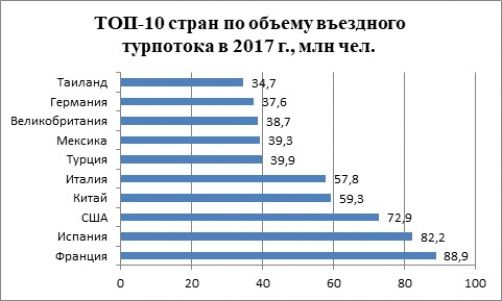
In terms of cash turnover, the descending order of the business structure is as follows:
- Hotel business.
- Services sector.
- Agricultural activities.
- Trade.
Competition in these industries is very high. Therefore, you have to start your business with original ideas. As an experiment, you can rent a ready-made business to gain experience and gain an understanding of the work of local entrepreneurs.
Immigration conditions for entrepreneurs from the Russian Federation
According to the signed convention between Italy and Russia, immigrants from both countries can open commercial enterprises and conduct business as residents. But if there are accompanying factors (large financial projects, services to government agencies, or conducting private scientific activities), the requirements for the business owner may change.
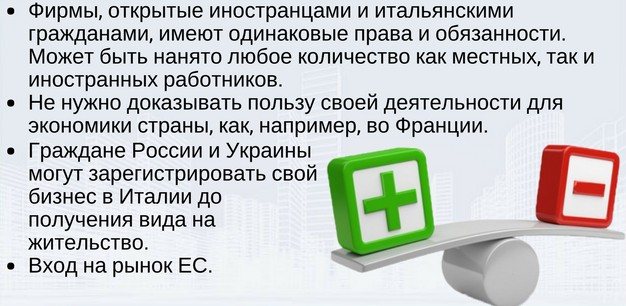
Advantages of doing business in Italy
*Russians who want to start a small business need only have a starting capital of 10 to 50 thousand euros.
You can read about the life of Russians in Italy by following this link.
Business in the land of wine and pizza
Beautiful sunny Italy. A country of fine wines, spas and pizza. Once you come here, you dream of staying forever. Let's figure out how to create a business here and what you should pay attention to.
Historically, the north of Italy became the center of cultural and industrial life, and the south became an agricultural region. Moreover, the entire elite that came to power came from the north and sought to strengthen this particular region, while the south was perceived more as a competitor. This led to an imbalance within the country, which still cannot be resolved. Employment is more attractive to southerners, and northerners are opening their own businesses.
Those who have been to the south of Italy can confirm the presence of many small enterprises there, specializing in various fields. Business in Italy is very developed, in the north there are large industrial enterprises, but in the south there are no large production facilities. The north has two big problems: bureaucracy (more developed than in the south) and criminal groups that control quite large territories. To open your own business in Italy, you need not only a visa, but also a work permit.
On video: Business in Italy legally, registration of PARTITA IVA
Purchasing an existing business or opening a new one
It is possible to buy a ready-made business in Italy in 2021. There are numerous agencies involved in sales. You will become acquainted with them during the registration process with the Chamber of Commerce and Industry.
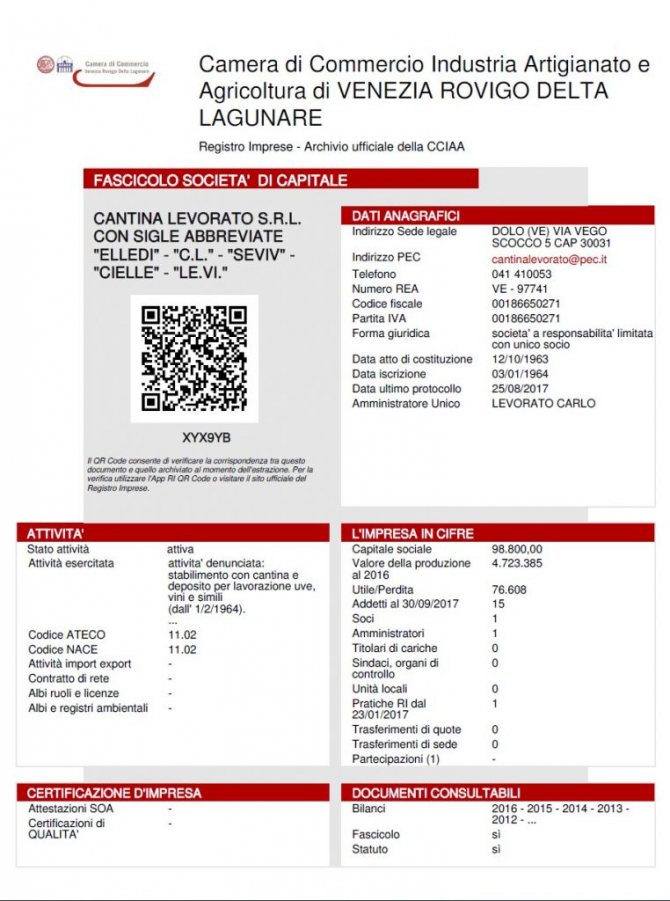
This is what the Company Dossier looks like from the Italian Trade Register
Lawyers will definitely advise you to pay attention to the sale of existing small businesses (mostly mini-hotels). At first glance, it is very tempting. However, you should be vigilant and order a full audit of the business being sold:
- Assessment of the current balance.
- Analysis of assets and liabilities.
- Studying the legal biography of the company.
- Get state information.
If you open a business in Italy from scratch, then the work ahead will be no less difficult. You will need to collect a lot of information about the location of the future project:
- Take into account the traffic and location of competitors.
- Assess the turnover of entrepreneurs located nearby.
- Find out the cost of land tax.
Below you can see an example of selling a ready-made business in Sanremo:
At the first stage, it is preferable to buy or rent an existing business. For example, a small beauty salon in Verona (cosmetology, hairdresser) with furniture and part of the equipment costs €35,000.
What type of business do Russian entrepreneurs use most often?
Russian business immigrants are trying to adapt to the existing way of life of the local population. For example, the north of Italy is saturated with industry. Profitable businesses in this region include:
- Repair Work.
- Design bureaus.
- Catering business.
- IT industry.
The south of the country is represented by the agricultural sector. There are many farms involved in crop and livestock production.
The tourism industry covers the entire Apennine Peninsula. Things always go well in this business in any corner of the country. The marginal income of travel companies can be up to 300%.
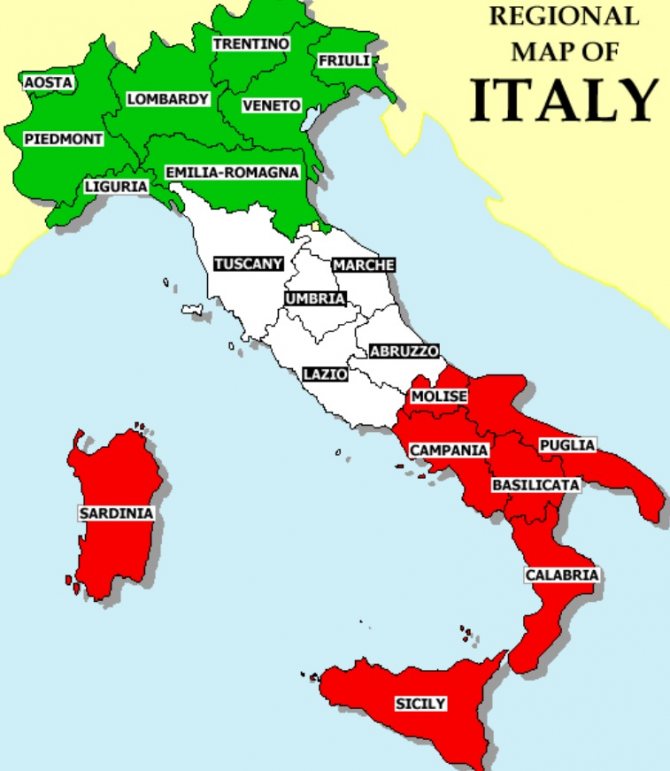
Regional divisions of Italy
In all of the listed types of entrepreneurial activity, we meet our compatriots as business owners.
Business ideas with minimal investment
The lowest-budget business in Italy for Russians is the service sector. By registering as a legal entity, you can work for yourself without hiring employees. You can do the following:
- Car repair.
- Services of a hairdresser and cosmetologist.
- Maintenance of household appliances.
- Plumbing repairs.
- Providing programmer services.
- Caring for the elderly.
You can find out about work and available vacancies in Italy by following this link.
If you have a starting capital of 30,000 to 50,000 €, then you can think about buying an apartment, a beauty salon, a mini-bakery or a mini-pizzeria. It is almost impossible to rent a place in one of the shopping and entertainment complexes. Retail outlets in such places bring good profits, and no one wants to give them up.
Personal experience and reviews of Russian entrepreneurs
After moving to Italy, Tatiana worked for several years in an elderly care service. During this time, the woman thoroughly studied the mentality of Italians. It's hard to surprise them with anything.
However, she noticed Italians showing interest in Russian culture. If the conversation turned to mentality, taste preferences, or how business is conducted in Russia, the interlocutors became very attentive and asked a lot.
Tatyana opened a group for those interested in Russian culture. Within two years it had grown to be profitable with offices in Rome, Milan, Pisa and Naples.
The company does business in several directions:
- Provides advice to Italians wishing to enter the Russian market with cheese products and olive oil.
- Conducts cooking courses in Russian cuisine.
- Sells souvenirs from Russia and books by Russian classics.
- Organizes tourist trips for Italians to cultural places of the Russian Federation.
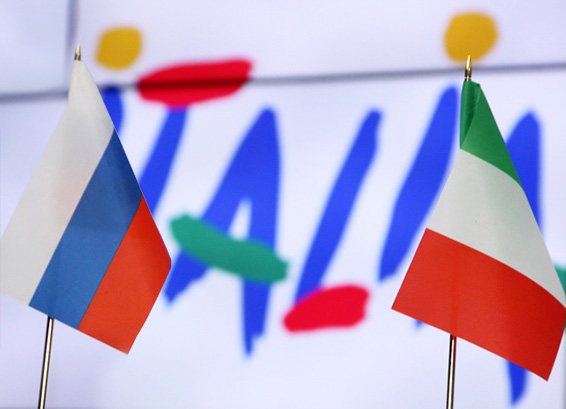
Another of our compatriots, Alexey, opened an agency to assist Russians with immigration. The entrepreneur's main client base is potential business immigrants.
He makes money by adapting entrepreneurs after moving. Helps you understand the peculiarities of doing business in Italy. According to the project consultant, the costs of organizing a private practice were insignificant.
*If the company suffered losses due to the payment of personal income tax, especially in the first three years, then these amounts can be included in the company’s expenses for the next five years.
How to move to Italy and open your own business there?
04/13/2021 RUBRIC: Moved
Author: Katya Zvezda
12985
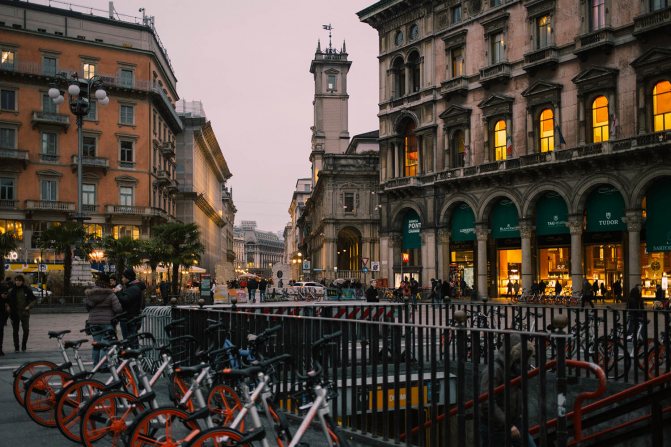
Having moved to Milan, Kharkov native Katya “Zvezda” forgot about her years of working as an MC and cocktail professional in the bars of Kazantip. The girl’s work in Italy is related to food and wine - here she founded her own TotallyItaly project about Italian gastronomy. Katya talks about how to start a new life in another country, change your occupation, launch your own project and continue to develop it even during a pandemic.
How it all happened
It all started 10 years ago, then I worked in different areas: marketing, advertising, club projects. But I realized that I wanted to be closer to food. At that time I lived in Moscow and ran a restaurant. Not from the kitchen side, but from the PR side. One day I went to Italy on a gastro tour, and I realized that I would like to do this myself.
The universe decided suddenly and in its own way. In Milan, I met my future husband, and then everything was swift – a director’s cut. We went to the USA, to Las Vegas, and got married there.
Documentation
Next I had to move to Italy. It was quite simple - you just had to wait for documents from the States, apostille, and so on by mail. At that time I was already in Italy on a visa. When the documents arrived, we had to take them to the commune. And that’s all - after that I became a full member of Italian society.
In fact, I never seriously thought about immigration and never considered Italy as a country for my life. It came as a shock to me that I moved here so suddenly. And I began to get to know this country by taste.
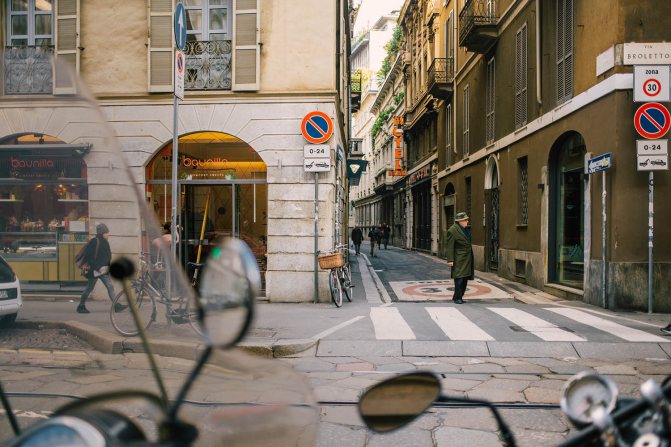
Photo: Palasatka
The language barrier
The biggest problem was language. I had traveled a lot before, and my language of communication – English – allowed me to find interlocutors everywhere. In Italy, the English language is much worse, especially if you move away from big cities. And in the village where I live, they look at you like you’re an alien if you don’t speak Italian.
“I haven’t sat at textbooks for a day. The tongue gradually stuck on its own.”
But it turned out that I didn’t sit at my textbooks for a day. The tongue gradually stuck on its own. Since I was studying local food, I had to travel to farms throughout the province. This is how I learned the language in the process (this is probably how children learn it).
Now I speak Italian without any problems, and sometimes I even have problems switching to another language, since Italian is my main one.
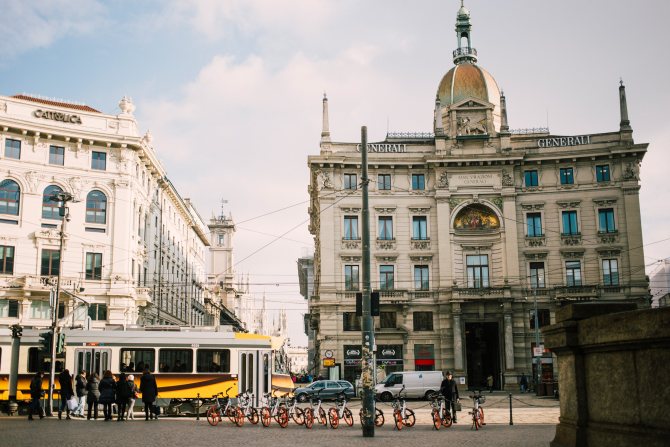
Photo: Palasatka
Housing
The housing situation here is interesting. There are stories around the world that Italians are mammone - children who live their whole lives with their parents. And this is not just a story. The fact is that housing here is expensive, and many Italians actually live in their parents' houses.
The second option is long-term rental housing; here this is not considered a problem. Many Italians who want to live separately rent housing. I am also renting a house now, it is on long-term lease.
I like living in the village - it’s authentic, it has its own flavor. Renting a small house starts from € 400-500 (in a big city, renting a house will be much more expensive). The really expensive part is paying utility bills.
In winter, some people walk around the house almost in fur coats - they save on heating because it is expensive. Or use fireplaces.
I live in a very beautiful area - in northern Lombardy. My village is called Torre d'Isola, it is located near the major A7 motorway. It's 15 minutes from Milan, an hour from Genoa - very convenient. If I want to go to the mountains, it’s also only an hour by car. For my “Dolce Vita” life, this is the place.
The nearest big city is 7 minutes away by car - Pavia. The eldest son goes to school there and will then enter the University of Pavia. The medical faculty there is considered one of the strongest in Italy.
Photo: Katya Zvezda
“I like living in the village - it’s authentic, it has its own flavor”
The only disadvantage of our area is that we live among rice fields - with the ensuing consequences. This is the carnaroli, or arborio, rice from which risotto is made. And the resulting consequences are humidity and a large number of mosquitoes. In humid summers, mosquitoes sometimes make it difficult to even have dinner on the veranda. Autumn and spring here are the times of fog. It's a real jelly - you can't get through the fog lights. And winter is very gray and rainy, there is no sun. But not for long: a couple of months and that’s it – spring.
For those who dream of moving to a village in Italy, I advise you to immediately take care of buying a car. You won’t be able to live a comfortable life here without a car. All infrastructure is located in big cities. In the village, apart from a small shop, a kindergarten and a commune where marriages are registered and divorced, there may be nothing else. But! There's definitely a local bar. Every morning people gather here for cappuccino, and in the evening for a digestivo.
Italy has a very serious aperitivo and digestivo culture. Aperitifs are drinks that stimulate the appetite. A digestivo is something taken after a meal. This is limoncello or some kind of strong alcohol and a cup of bitter coffee. All this is accompanied by gossip and small talk about the weather, politics and food.
Photo: Katya Zvezda
Medicine
Medicine in Italy is simple. Back to USSR, as I call it. You receive a “sanitation card” and receive free service. You also have a family doctor. There is also paid medicine, but most residents use free medicine - it is at a good level.
The only problem is the queue - you can be seen in a month or even more if the doctor is in demand. Naturally, in the case of “Urgente” - an urgent need - there is always an ambulance: everything is fast, efficient and at the highest level.
Your own business
I laugh at the Italian bureaucracy. The saying “acne because there is no sex, there is no sex because there is acne” is just about the local bureaucracy. You have to constantly wait until your paper is moved from one pile to another. I admire Ukraine in this regard – everything is automated there. Everything happens quickly and politely, without filling out a hundred million papers. Italy, it seems to me, is still far from this.
To open your own business in Italy, you need to get your own commercialist - an accountant who will manage all your affairs. This is the person you will have to go hand in hand with. After this, the show begins: registration takes about a month, or even more. You will have to fill out a lot of paperwork in different services, and a good commercialist will just help you avoid unnecessary movements.
Taxes in Italy are very high, some of the highest in Europe. Complaining Italians are a classic. Everyone complains about politics, about how bad business and work are going, but at the same time everyone lives and enjoys life.
I have several areas of business. The first is enogastronomic tourism, that is, I show Italy through food and wine. The second is the enogastronomic bureau. We select cheeses, wine, various unusual ingredients, put them into boxes and send them all over the world.
And we just started developing the third direction before the pandemic - and for now it’s on pause. This direction is called “School of Enogastronomic Tourism” - there we share our organizational knowledge. We made the first group in March 2021. I conducted a 5-day masterclass, training, tastings, talked about my experience of organizing, how to understand wines, food, what kind of documentary base is needed. And also about how to organize comfortable tourism for people. Not the kind of tourism that: “Here we have the Coliseum or look at the Duomo,” but tourism through the prism of food: wine and interesting gastronomic places.
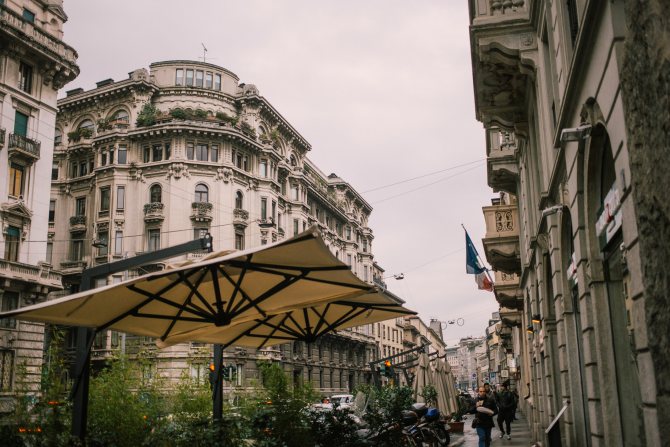
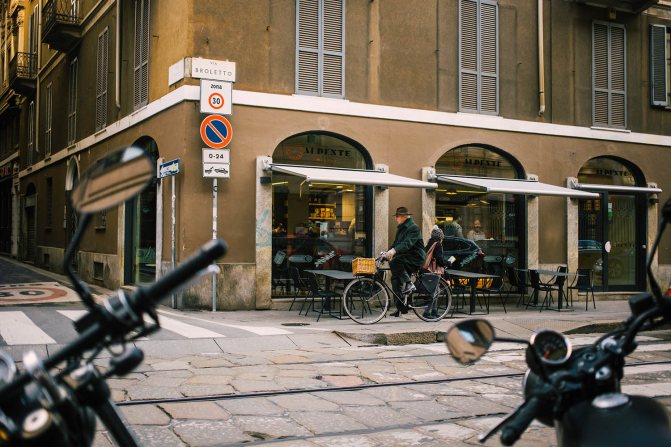
Photo: Palasatka
Italians
Italians don't say about themselves: I'm Italian. They say: I am Lombardian, I am Neapolitan, I am Ligurian. In the south, people are more open and emotional - these are the same Italians who speak loudly and gesticulate. It is believed that in the north, residents are more reserved, silent and more educated. The south is more agrarian and simpler.
Many people who moved to Italy say that Italians are unfriendly. It's not like that at all. Italians usually perceive foreigners as tourists. If you have moved, they will look at you for a long time. I initially met Italians and said that I really love their culture, I know a lot and continue to study. And my job is to show their country to the world, to show how beautiful, tasty and wonderful it is. And she asked me to help with this. Perhaps that is why I had no problems in communication. Those people who are around me are true friends. These are cheese makers, winemakers, restaurateurs. It so happened that I don’t have much time to be friends with the diaspora here. My social circle is Italians, my TotallyItaly family. I visit them, they visit me, we celebrate Christmas at a big table.
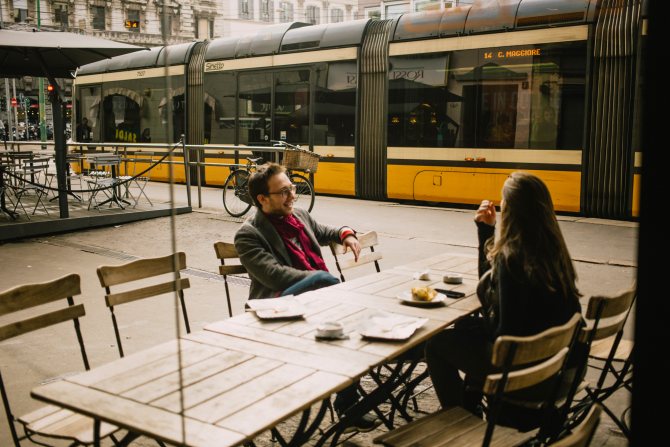
Photo: Palasatka
Food
What is Italian food? There is no such concept - there are regional cuisines. In Lombardy they eat risotto, a lot of meat, a lot of cheese. Sicily is a cuisine of fish and eggplant. Naples is a region of pasto filato cheeses, pasta and tomatoes. Lazio is the region of artichokes, carbonaro and amitriciano pastes. Liguria is a region of pesto and Taggisco olive oil.
Photo: Katya Zvezda
“Italians eat a lot and with pleasure”
In Italy there is “zero kilometer” food – “kilometro zero”. This is the concept that you eat what is available in the region in which you are. And besides, the products must also be seasonal. It’s very strange for Italians if you eat pizza with brie cheese in the summer – it’s a winter taste. It’s the same as eating minestrone in winter, because it’s a vegetable soup made from summer vegetables. Autumn is the time of pumpkins, mushrooms, truffles. And in the spring - grilling. Everything has its time, everything has its place. Regarding food - and everything else!
Italy is the second longest living country in the world. We eat very high quality food here, with a lot of olive oil and good wine. And also the correct ritual of consumption. Italians eat a lot and with pleasure. No one is on their phone, no one is in a hurry, everyone is communicating. And eating is a real cult.
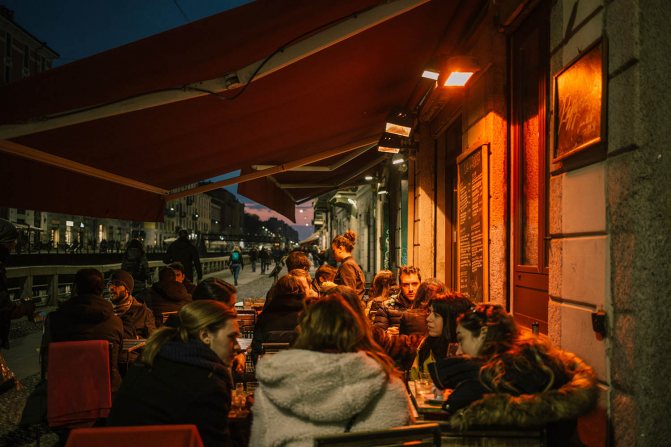
Photo: Palasatka
Padnemia
This is a painful topic for me, because when the pandemic began, my tourism business completely stopped. Italy is divided into red and orange zones. The restaurant business is frozen. You cannot travel from region to region - only with special documents.
In winter, I traveled to the accessible regions: Val D'Aosta, Valtellina and Trentino Aldo-Atige, where I collected northern sets. And Vlad Fisun from DJBuro put together a mix of Italian tracks and added a video, which he managed to film in the mountain resort of Passo Tonale a week before the start of the pandemic. This way we were able to support small farms that did not have a traditional tourist season, and trade froze. With our joint help, we were able to somehow revive their affairs.
Children are also suffering because of the lockdown - they are not allowed to communicate, only online. My eldest son was robbed of the most interesting last year of his school life. The youngest is 10 years old, he would like to play sports and communicate with friends, but all this is not available yet. In general, their whole life is now at home, around computers.
And yet I am lucky that this situation is happening in Italy.
Italians, although they often complain, are actually optimistic people and do not lose heart. The sun is shining, the grass is green, the wine is good, the food is delicious - and we really hope that we will soon be able to share all this with the whole world.
Tags: Italy
12985
Legal nuances
An entrepreneur can prepare documents for business registration himself or contact a lawyer. In the second case, the procedure will be faster, without possible risks. But you will have to pay about 15,000–20,000 € for services.
The final cost depends on the law firm and the scope of work. If you go through the authorities with a representative, it will be cheaper.
Stages of business registration
The entrepreneur and his lawyers need to prepare documentation for registration with the Chamber of Commerce and Industry. The package of documents in 2021 includes:
- Charter of the enterprise. ()
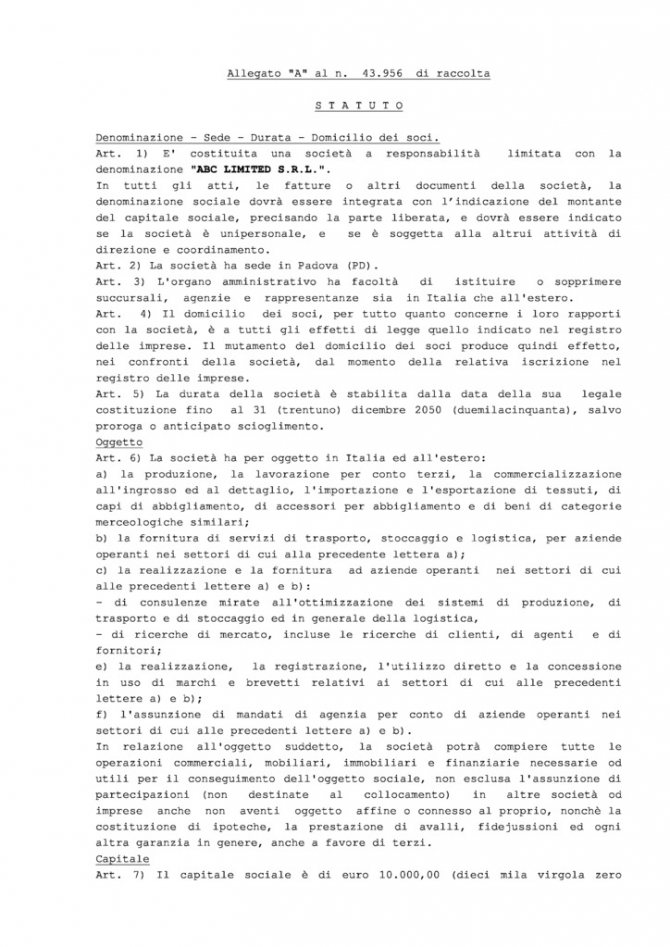
Example of an enterprise charter
- Bank statement confirming account opening.
- Receipt for payment of state duty.
- Notice to the Bureau of Labor regarding the hiring of employees.
The cost of the state registration fee will be from 220 to 300 €. The amount depends on the form of registration of the legal entity. You can issue:
- General partnership (Società in nome collettivo, SNC). It implies the participation in the business of several shareholders with shares established in the charter.
- Limited partnership (Società in accomandita semplice, SAS). Shareholders and investors can be registered in this organization.
- Limited liability company (Societa a responsabilita limitata, SAP). Can be founded by one person with an authorized capital of 10,000 €.
- Individual entrepreneur (II). You can work independently or for hire.
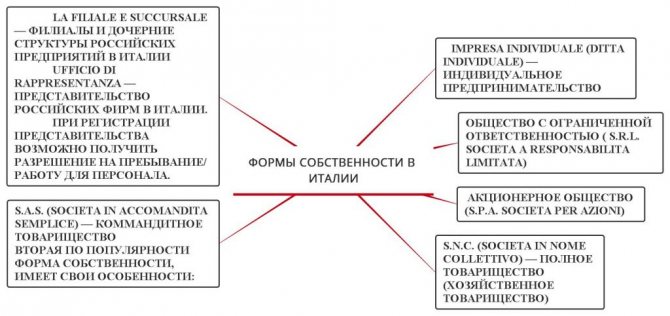
*The first form, SNC partnership, is suitable for moving the whole family at the same time. Otherwise, reuniting with loved ones is allowed after a year of independent work and a turnover satisfactory for Italy.
Taxation
According to reviews of business immigrants from the Russian Federation, taxation in Italy remains quite complex compared to other EU countries. In addition, the state has a progressive scale. You will have to pay the following percentage:
- 22% - VAT, IVA (imposta sul valore aggiunto); food - 10.5%, printing - 4%.
- 24% - federal income tax, IRPEF (imposta sul reddito delle persone fisiche).
- 4.25% - regional income tax, IRAP (imposta regionale sulle attività produttive).
- 30% — advance payment for municipal tax, IMU (imposta municipale unica); calculated from the amount of annual income for the previous year.
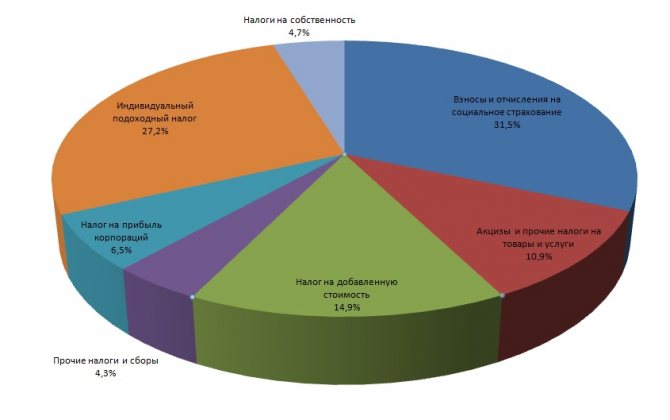
Tax distribution schedule (%)
Progressive tax scale in Italy
| Taxable base (€) | Personal income tax rates (%) |
| 0 – 15 000 | 23 |
| 15 001–28 000 | 27 |
| 28 001–55 000 | 38 |
| 55 001–75 000 | 41 |
| 75 001– | 43 |
At the regional level, a progressive tax is also levied at a rate of 0.7–3.33%. The size is set by the local authority.
Connections and bureaucracy
Italians are not known for their punctuality. Being 1.5–2 hours late for a business meeting is normal for them. When meeting, local entrepreneurs evaluate the taste of the newcomer: how he is dressed, what he is wearing and how well-groomed he is. All this will be noted and a conclusion will be drawn.
Bureaucratic delays are the same as in the Russian Federation, and there is corruption. Bribes are taken in a veiled form and only through trusted intermediaries. Almost everything is decided by connections at the family or friendship level.
What business to open in Italy?
The most common forms of ownership
- Limited Liability Company. Such a company may have several owners, but it must be led by one person. The minimum authorized capital is 120 thousand euros, and a quarter of this money must be deposited into the account when registering the company.
- Closed joint stock company. It must also be led by one person. Here the minimum authorized capital is many times smaller - only 10 thousand euros.
- Shareholder partnership. This form of registration does not provide for authorized capital when opening a company. But the enterprise does not receive legal status.
In Italy there are still other forms. You can create an open LLC, individual entrepreneur, general partnership, limited partnership.
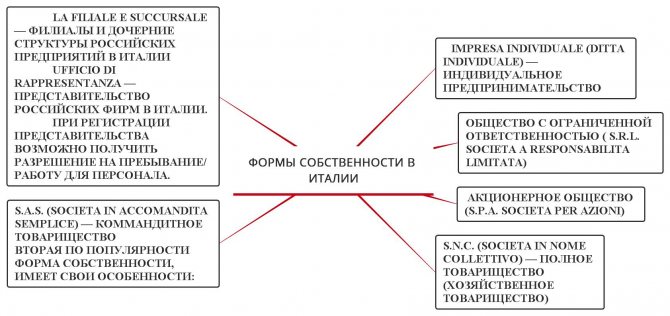
Forms of ownership in Italy
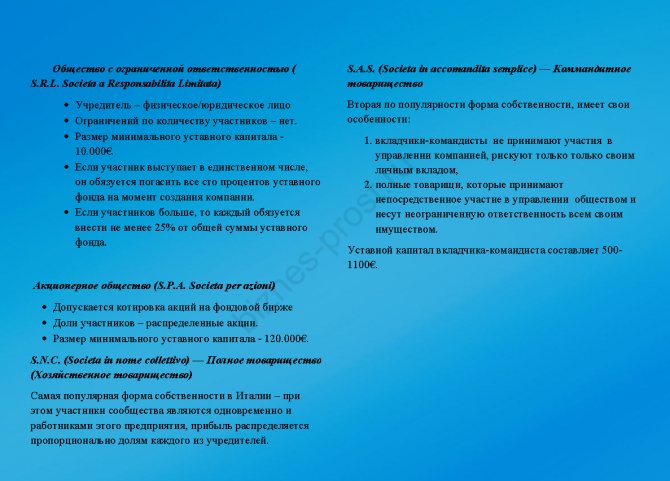
Business registration forms in Italy

Registering a business in Italy features
On video: Features of business in Italy
Business culture
Italians are very temperamental, although sometimes they behave measuredly. An explosion of emotions can happen instantly. This may be unusual for migrants who have just arrived.
Before starting a common business with you, the Italian will try to get to know you better. And only then will he decide on partnership.
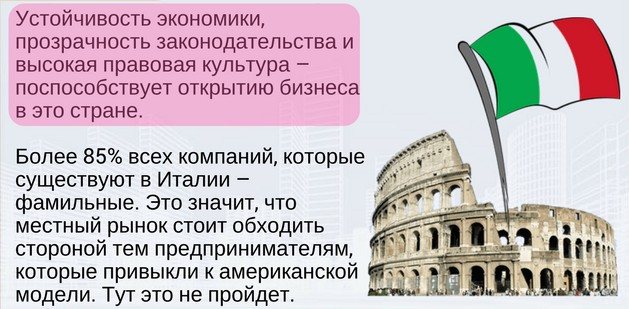
Local businessmen are not characterized as greedy people. They do not need immediate benefits if it distracts them from family matters. They consider their earnings sufficient and are in no hurry to get all the money in the world.
Overtime work: on holidays, weekends or lunch breaks is taboo.
If you or your business proposal does not suit the Italian for any reason, he will say so right away. Having promised to find out some information, he quickly forgets about it. You will have to remind them by phone more than once and send several letters by e-mail.
But all this becomes commonplace after one or two years of running your own business in Italy.


